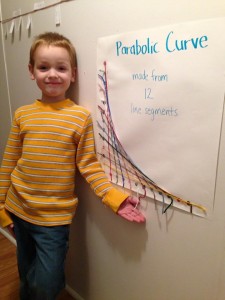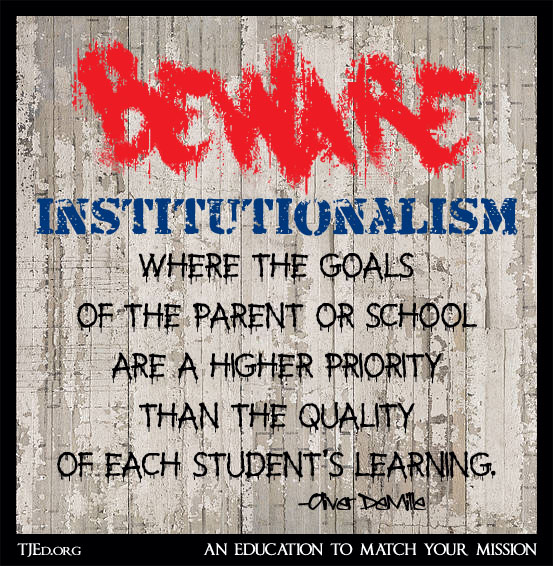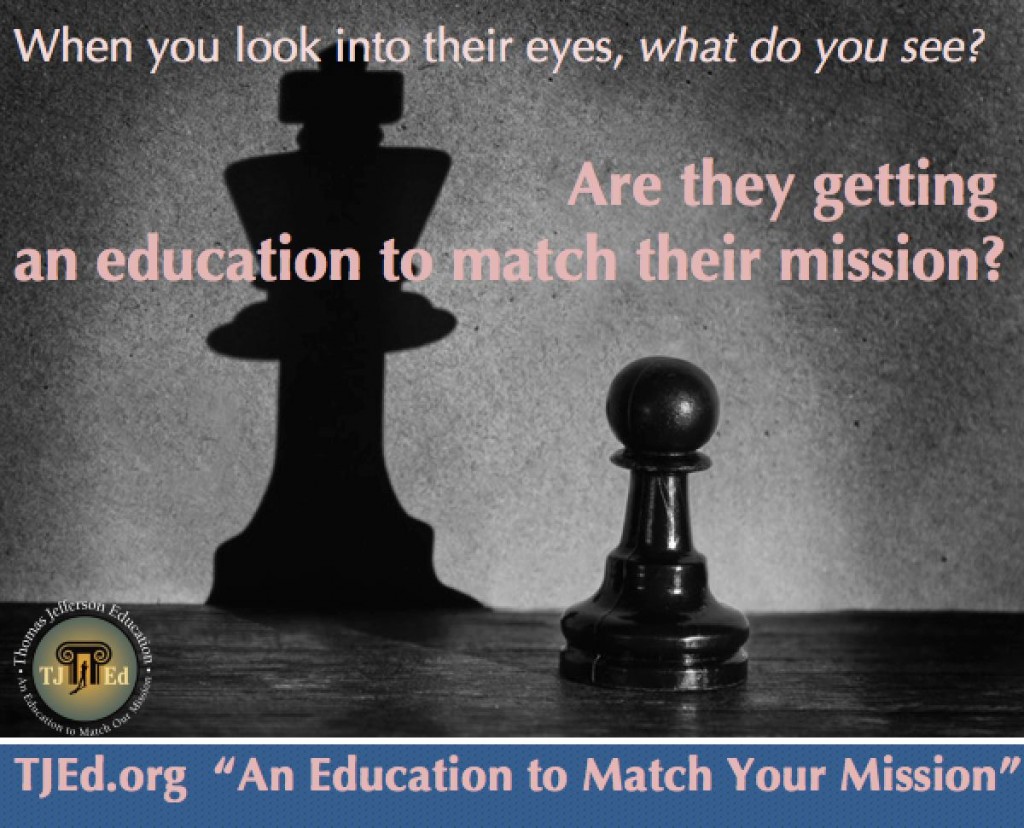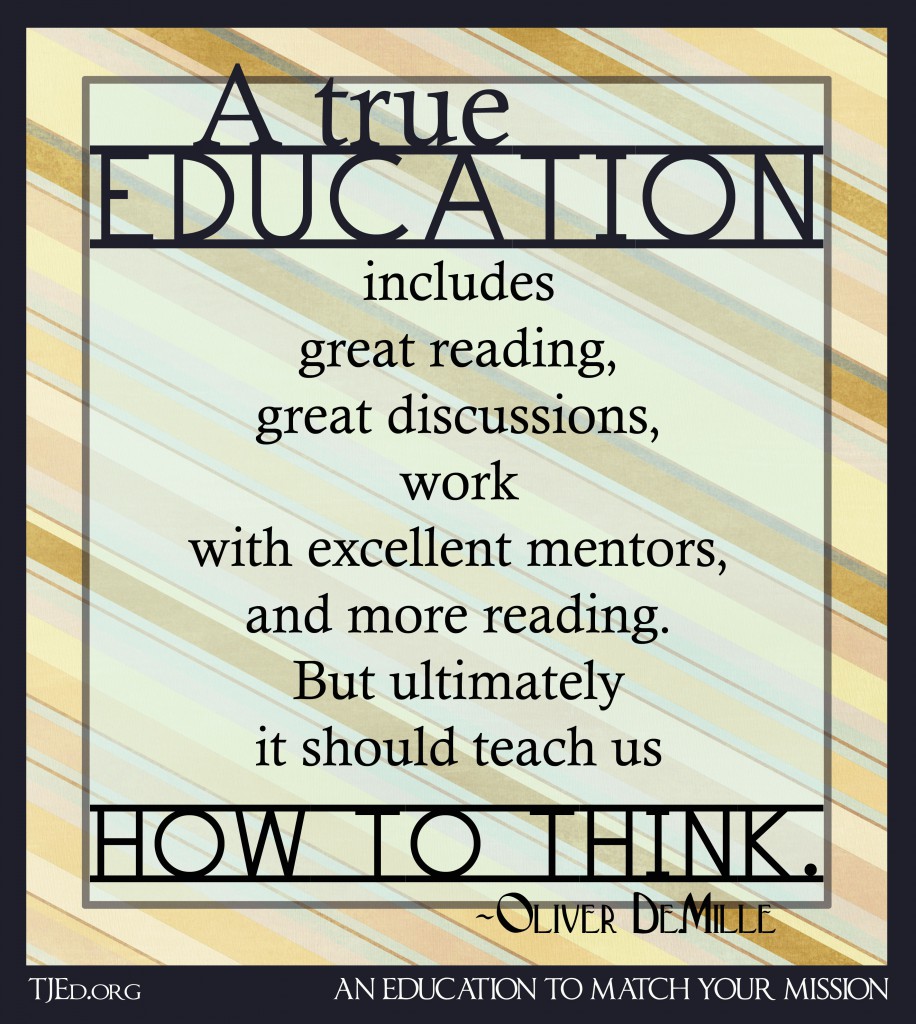Leadership Education is not for everyone. And it might not be for you. So be forewarned – there are several reasons why you shouldn’t do TJEd….
1) The TJEd learning model is chaotic and unregimented.
- TJEd expects too little from the smallest children. It promotes the idea that young children actually learn from play, work, example, relationships and interactions with siblings, family and close community.
- TJEd is too idealistic with regard to older children. It teaches that healthy children have a natural inclination to learn, and that the ideal educational program for pre-adolescent children includes exposure to an environment rich in opportunities to interact with ideas, projects and people, with emphasis placed on exploration, experimentation, creativity, initiative, and curiosity. TJEd posits that this ideal environment will include parents and other adults who demonstrate a life-long passion for learning and application of what they learn in real and meaningful ways.
- TJEd teaches that those who are out-of-sync with their learning, or who have lost their love of learning, can regain it to continue on a healthy love-of-lifelong-learning path. It promotes the ideal that families can learn in a harmonious, synergistic way that honors the individuality and needs of each one, with less stress and greater results than the typical “conveyor-belt” model.
- TJEd expects too much from youth. It promotes the ideal that adolescence is the time for serious study and development of skills, talents and dreams that will prepare the individual for success in all areas of their life. It teaches that youth with a sound Core and healthy Love of Learning enjoy such study, and thrive on it. It expects that healthy youth in puberty and beyond will progress to the point of studying, on the norm, between 6 and 14 hours per day, nearly year-round, in preparation for even deeper, more focused, studies in young adulthood under the guidance of a mentor.
2) TJEd is subversive and non-conformist.
- TJEd harmonizes with the ideas and methodologies promoted by subversive and non-conformist educational philosophers such as Jean Piaget, Erik Eriksen, John Holt, Peter Gray, Maria Montessori, Shinichi Suzuki, Charlotte Mason, John Taylor Gatto and the like.
See for example, this graphic illustration from independent researchers whose conclusions agree with TJEd:
3) TJEd is dismissive of credentialism.
- TJEd gives high preference to teachers who distinguish themselves as caring and engaged mentors – who personalize their approach to each student and her needs at a given phase of development – over “profess-ors” whose educational achievements are stagnant and uninspiring, and whose interactions with their students tend to be systematic, rote and/or demanding without consideration for their effectiveness for the individual student.
4) TJEd neglects popular or trending sources.
- TJEd prefers classics, which it defines as works (ancient through contemporary works included, in any medium and genre) that are original, transformational and of enduring worth, and which yield new meaning and value with each exposure – over textbook-type books that digest, compartmentalize, define and/or dumb-down their subject matter according to “expert” retellings of information.
5) The children are odd.
- Children raised using principles of Leadership Education can tend to make adults uncomfortable due to their large vocabularies, their comfortable and casual references to Shakespeare and the like, and their tendency to be wide-read and animated about their learning.
- They often have informed opinions on political, social and current events issues and can seem impertinent and precocious in conversations due to their contributions in discussions where children or youth normally don’t participate.

- Younger TJEd children especially may tend to give strange answers to such questions as “What grade are you in?”, “Do you like your teacher?”, “What did you do in school today?”, etc.
- TJEd children’s timeline is not uniform or standardized, and their depth in certain areas of interest tends to far exceed the norm.
- Children raised with the principles of Leadership Education have an unfair advantage in science fairs, geography tournaments, spelling bees and technology challenges, and their college entrance exams, rates of retention and time to completion excel beyond the average for private, parochial and public school peers.
- They are often equally comfortable with children, youth and adults at virtually any age, and tend to name their immediate family as their favorite friends, playmates, confidantes, etc.
6) TJEd expects learning to be creative, innovative, correlative, relevant and transformational.
See, for example, these sample posts on subject matter learning:
- Math
- Foreign Language
- Poetry
- Spelling
- Using classics to teach around the curriculum
7) TJEd expects too much from the parents.
- TJEd is also known as “Leadership Education.” And the leader in LE is not *just* the kid that grows up in your home under these principles; it’s you! YOU lead out and show them the way. You get excited about education – not just theirs, but *yours*.
- If TJEd is calling to you, we don’t recommend “winging” it. Don’t just copy a friend, or browse and guess. You’ll feel so much more confident and in control when you do your homework.
- Our TJEd Implementation course, Mentoring in the Classics, is set up specifically to help you become a self-guided learner, design your ideal family education culture, become conversant in the language of the classics, and really *own* the principles of Leadership Education so you can be your own expert.
Sign up for our free newsletter today to request our select bonus downloads that will help you discover if TJEd is right for you!





































Leave A Comment